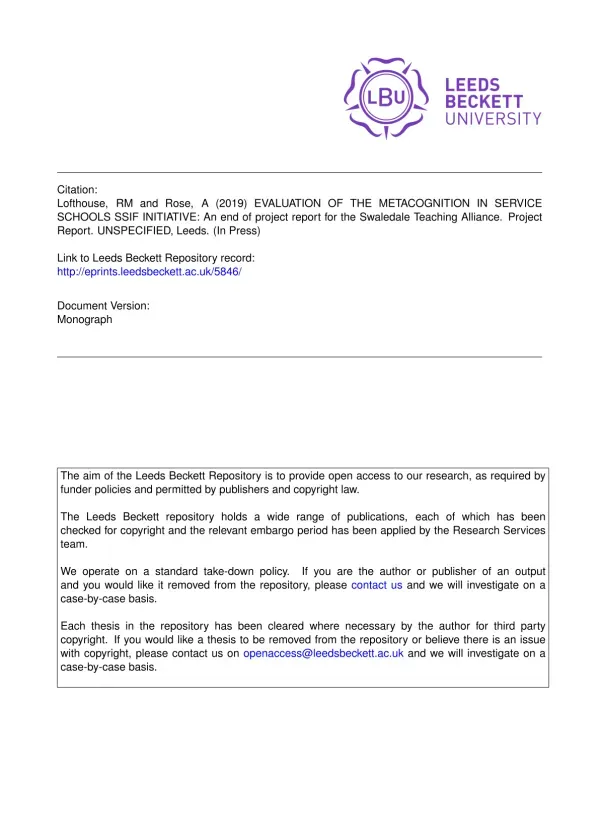
Evaluation of the Metacognition in Service Schools SSIF Initiative
Document information
| Author | Rachel Lofthouse |
| School | Leeds Beckett University |
| Year of publication | 2019 |
| Company | Swaledale Teaching Alliance |
| Place | Leeds |
| Document type | Project Report |
| Language | English |
| Number of pages | 31 |
| Format | |
| Size | 1.25 MB |
- Metacognition
- Education
- School Improvement
Summary
I. Introduction
The Evaluation of the Metacognition in Service Schools SSIF Initiative serves as a comprehensive report detailing the outcomes of a project aimed at enhancing metacognitive skills among students in service schools. Conducted by the Swaledale Teaching Alliance, the initiative was supported by the DfE Strategic School Improvement Fund (SSIF). The project spanned five terms, from September 2017 to April 2019, and involved ten primary schools in North Yorkshire, primarily serving children from military families. The report emphasizes the importance of metacognition and self-regulation as pivotal pedagogical strategies. These strategies empower students to take ownership of their learning, fostering a culture of confidence and resilience in academic settings. The findings highlight the necessity of adapting teaching methods to meet the unique challenges faced by mobile student populations, particularly in mathematics, where historical performance has lagged behind national averages.
II. Project Overview
The project aimed to introduce metacognitive strategies into the curriculum, focusing on mathematics. The evaluation revealed that the initiative was designed to address specific challenges faced by students, including high mobility rates and inconsistent educational experiences. The report outlines the collaborative coaching approach employed, which involved Lead Practitioners and Lead Teachers working together to implement metacognitive strategies effectively. The evaluation process was qualitative, gathering insights from various stakeholders, including educators and project managers. This approach allowed for a nuanced understanding of the project's impact on teaching practices and student engagement. The report underscores the significance of collaborative professionalism in fostering a supportive learning environment, where educators can share best practices and learn from one another. The findings suggest that such collaborative efforts can lead to sustainable improvements in teaching and learning outcomes.
III. Key Findings
The evaluation identified several key findings regarding the impact of the initiative on students and teachers. Notably, there was anecdotal evidence of positive changes in student attitudes towards learning. Students became more confident in their abilities, particularly in mathematics, and began to view mistakes as opportunities for growth rather than failures. The report highlights the importance of creating a classroom environment that encourages risk-taking and inquiry. Additionally, Lead Teachers reported significant professional development through their involvement in the project. They appreciated the ongoing support and coaching provided by Lead Practitioners, which contributed to their growth as educators. The findings emphasize the need for schools to select appropriate Lead Teachers who can effectively champion such initiatives. Overall, the project demonstrated that targeted professional development and a focus on metacognitive strategies can lead to meaningful improvements in educational practices.
IV. Challenges and Limitations
Despite the positive outcomes, the evaluation also acknowledged several challenges and limitations. One significant issue was the difficulty in measuring the direct impact of the project on student achievement due to the lack of quantitative data. The report noted that while anecdotal evidence suggested improvements in student engagement and confidence, concrete metrics were not established to assess academic progress. Additionally, the evaluation did not consider the quality of teaching and learning in detail, which could have provided a more comprehensive understanding of the project's effectiveness. The report calls for future evaluations to incorporate robust assessment methods to capture the full impact of such initiatives. Furthermore, the sustainability of the project beyond its funding period remains a concern, as schools may struggle to maintain momentum without ongoing support. Addressing these challenges is crucial for the long-term success of metacognitive strategies in educational settings.
V. Conclusion and Recommendations
The Evaluation of the Metacognition in Service Schools SSIF Initiative provides valuable insights into the implementation of metacognitive strategies in primary education. The report concludes that fostering a culture of self-regulation and reflective learning can significantly enhance student outcomes, particularly in challenging contexts. Recommendations include the need for ongoing professional development for educators, the establishment of clear metrics for evaluating student progress, and the importance of securing leadership buy-in to ensure the sustainability of such initiatives. The findings advocate for a continued focus on collaborative professionalism among educators, as this approach not only benefits teaching practices but also enriches the learning experiences of students. By prioritizing metacognitive strategies, schools can better equip students to navigate their educational journeys, ultimately leading to improved academic performance and personal growth.
Document reference
- EVALUATION OF THE METACOGNITION IN SERVICE SCHOOLS SSIF INITIATIVE: An end of project report for the Swaledale Teaching Alliance (Lofthouse, RM and Rose, A)
- Teaching Thinking Skills (Education Endowment Foundation (EEF))
- LORIC as a resource to help deliver metacognition in schools (Swaledale Teaching Alliance)
- Partners in Excellence (PiXL) Primary Edge Program (PiXL)
- CollectivED: a research and practice Centre in the Carnegie School of Education at Leeds Beckett University (CollectivED)
